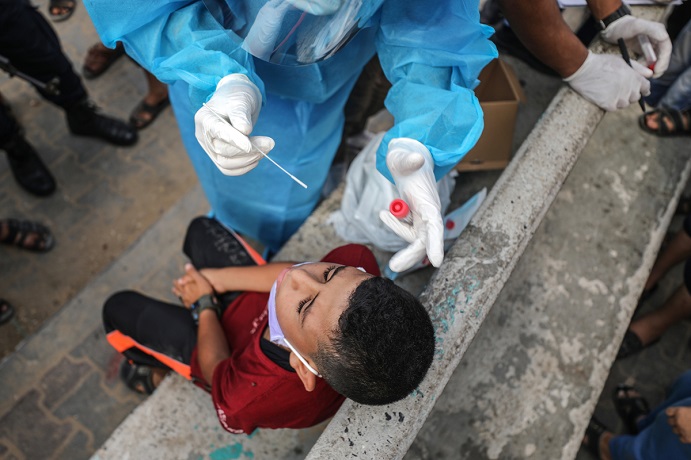Middle East Eye / December 19, 2020
The national vaccination campaign will include Jewish settlers living in the occupied West Bank but exclude millions of Palestinians.
Israeli Prime Minister Benjamin Netanyahu received a Covid-19 vaccine jab on Saturday, kicking off a national rollout over the coming days.
The massive vaccination campaign, said to be the biggest in Israel’s history and titled “Give a Shoulder”, will not include millions of Palestinians living under Israeli control despite a recent spike in cases and deaths stemming from the virus.
Meanwhile, Jewish settlers living in the occupied West Bank are eligible for the jab.
Netanyahu, 71, and Israel’s health minister were injected with the Pfizer-BioNTech vaccine live on TV at Sheba Medical Center in Ramat Gan, near Tel Aviv.
“I asked to be vaccinated first, together with Health Minister Yuli Edelstein, to serve as personal examples and encourage you to be vaccinated,” Netanyahu told the television audience.
Each recipient must receive a booster shot in three weeks for optimal protection from the novel coronavirus.
Latest Israeli health ministry figures reported over 370,000 people had tested positive for the virus since the Jewish state, a country of around nine million, confirmed its first case in February.
Just over 3,000 people have died.
Netanyahu said receiving the vaccine was a first step toward a return to normality, months after a second nationwide lockdown was imposed in September, when the country had one of the world’s highest per capita infection rates.
“On the way here I thought about the children worried about their parents, the grandchildren who want to hug grandma and grandpa — not a Zoom hug but a real hug,” he said.
“We will be able to go to football grounds, to see basketball games and, of course, to reopen the country and restore it to what it was, to go back to the normal life that we desire.”
The vaccine will be rolled out at 10 hospitals and vaccination centres around Israel for healthcare workers from Sunday, according to the health ministry.
During the course of the week, a ministry statement said, vaccinations will be extended to the general public, starting with those aged over 60.
Israel reached an agreement with the Pfizer pharmaceutical company to supply 8 million doses of its newly approved vaccine — enough to cover nearly half of Israel’s population of 9 million, since each person requires two doses.
Israel reached a separate agreement with Moderna earlier this month to buy six million doses of its vaccine – enough for another three million Israelis.
Palestinians left waiting
But millions of Palestinians living under Israeli control will have to wait much longer.
Israel’s vaccination campaign will include Jewish settlers living deep inside the West Bank, who are Israeli citizens, but not the territory’s 2.5 million Palestinians.
They will have to wait for the cash-strapped Palestinian Authority, which administers parts of the occupied West Bank in accordance with interim peace agreements reached in the 1990s, to provide them.
The PA hopes to get vaccines through a WHO-led partnership with humanitarian organisations known as COVAX, which has so far fallen short of the 2 billion doses it hopes to buy over the next year for those in poor countries.
Complicating matters is the fact that the Palestinians have only one refrigeration unit capable of storing the Pfizer vaccine.
The Palestinian Authority has reported more than 85,000 cases in the West Bank, including more than 800 deaths, and the outbreak has intensified in recent weeks.
The situation is even more dire in Gaza, home to 2 million Palestinians, which has been under an Israeli and Egyptian blockade since Hamas seized power in 2007. Authorities there have reported over 30,000 cases, including 220 deaths.
Israel’s Deputy Health Minister Yoav Kisch told Kan Radio that Israel was working to attain a surplus of vaccines for Israelis and that “should we see that Israel’s demands have been met and we have additional capability, we will certainly consider helping the Palestinian Authority.” He said doing so would help prevent a resurgence of outbreaks in Israel proper.













